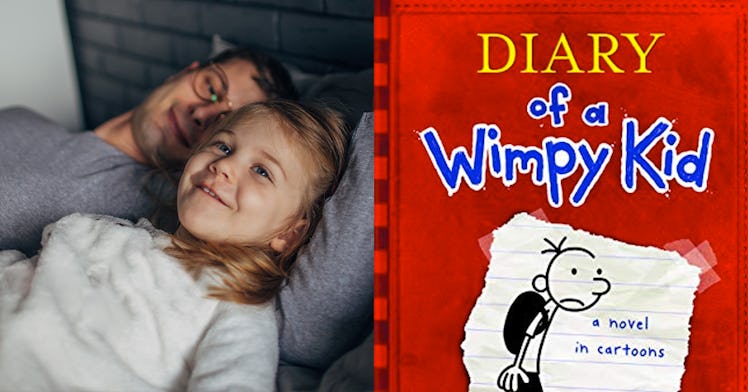How To Make Up Bedtime Stories From The Author Of ‘Diary Of A Wimpy Kid’
180 million readers can't be wrong.

For more advice on fun stuff to do with your kids, from ridiculously overqualified experts, check out the rest of our 940 Weekends.
Every night your kid expects to settle in with an original, epic bedtime tale. And, like a tiny Hollywood producer, they always have a few notes. Can it star them? What about their friends? Is there a fire engine parade? A mountain of candy? Does it feature a narrative arc from Sofia The First? The best bedtime stories for kids tend to be relatable, feature a clear process of growth, and possibly, has your child as the hero. By the end of it, you have a greater appreciation for Stephen King’s prolificness.
What happens when you’ve exhausted all the fairy tales you know, and are now recycling Game Of Thrones plotlines (minus some of the nudity)? Ask Jeff Kinney, author of the hugely successful Diary Of A Wimpy Kid book series (and the recently released Diary Of A Wimpy Kid: Double Down). He may have sold 180 million copies, but at home, Kinney was expected to produce original work. And although his boys are now past the age where they want to listen to his bedtime stories for kids, Kinney still has a lot of professional advice for the dad who suffers from nightly writer’s block.
Exercise Your Thoughts
Kinney finds the best way to get over writer’s block is to jump over it. Low-impact physical activity, like a few burpees or a quick jog around the cul-de-sac, releases endorphins. “I’m always stuck,” says Kinney. “To force ideas, I go on really long walks, sometimes 10 miles a day, to get my gears turning. If I lay down to think about something, I’m just going to fall asleep.” Remember, the goal is your kid sleeping — not you.
Sketch It Out Ahead Of Time
Four years of thinking and mulling went into Kinney’s runaway success of a children’s series. Because ain’t nobody got time for that, give yourself a head start before bedtime. Jot down a quick outline of the plot sometime in the morning (don’t spend 4 years on it). Then, set an alarm when you can allocate 15 minutes during the day to flesh out the details of the story. No more retelling the Tale Of The Grumpy Bear Who Is Missing The First Half Of Monday Night Football.
Write What You Know
It’s a cliche for a reason. No need for George R.R. Martin-level world-building when you have real-life at your disposal:
- Make It About You: Stories pulled from your life are the easiest source of the material. And, it doesn’t matter if it happened last night or last week — your preschooler doesn’t know the difference. “In lieu of reading books to my kids or telling them other conventional stories, I actually tell them funny stories from when I was a kid,” says Kinney. “They seem to be more interested in that than anything that comes out of a book.” Plus, they’ll have ammo to call you a hypocrite later in life.
- Make It About Them: This is another obvious way to immediately grab your child’s attention — pull from something they told you about their day. “Every so often, something trickles in from my kids’ lives,” says Kinney. “What’s really good about having kids is that it gives you a chance to see the world a second time.”
- Talent borrows, genius steals: Your kids are likely far too young to read Jurassic Park, but a bedtime story about a dinosaur amusement park will thrill them. Until a few years later when they actually watch Jurassic Park. Then you can tell the story of how Michael Crichton stole your manuscripts.
The Elements Of A Good Story
- It Needs To Change: “No one wants to read about a hero that doesn’t transform over the course of a story,” says Kinney. “Most really good stories are about change, where the world is different at the end than it was at the beginning.”
- Make It Identifiable: Back to the point about borrowing from your kid’s life — simplify. You don’t need to couch stories in a ton of backstory that’s irrelevant to their lives. A tale about a magical land where they rule — good. A tale about a magical land where they might rule if they can close that polling gap among single wizards and trolls on Medicare — bad.
It’s All Quality Time
If you’ve gotten to the point where telling a bedtime story is just going through the motions, you’re not seeing it for what it is: quality time. “Being a father is the most important thing in my life, but it’s also very challenging,” says Kinney, who said his books got popular when his boys were young, and he’d have to choose between being at their play or supervising a Wimpy Kid film adaptation. Sure, you probably won’t have the same issue. But, if any of your stories do get optioned to be films, your kids can be proud they heard the first draft.